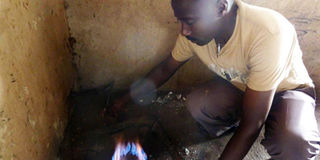Rural Masaka schools using biogas, farming to reduce costs

One of the biogas cook stoves at Suubi Secondary and Vocational College. Biogas helps reduce costs of expenditure on electricity and lighting at the school. Photo by Michael J. Ssali
What you need to know:
- With the economy getting tighter, rural Masaka schools are devising means to stay afloat.
One of the major drawbacks faced by school managers in Uganda are the high administrative costs such as electricity and fire wood bills, among others. There have always been press reports about some schools closing for holidays before the official Education ministry date or suspending meals due to budgetary constraints.
David Ssemwogerere, the director of Suubi Secondary and Vocational College in Lwengo District, agrees that the cost of living has risen and there are financial constraints in nearly all educational institutions.
“However, as school administrators and proprietors, we have a duty to provide and make education affordable. It is the reason we accept items such as eggs as a form of school fees payment at Suubi. We also train students in farming skills and where possible help them to acquire animals such as pigs and poultry. That way, they can sell eggs, piglets, or some vegetables and fruits to contribute towards their educational costs,” he said.
Exploring alternative energy
Ssemwogerere adds that one of the worries for many schools is the high cost of firewood for cooking school meals and electricity for lighting. A big number of education institutions in the country use hydroelectricity yet there are alternative cheaper sources of energy such as solar and biogas.
“We use our school pit latrine to produce biogas for lighting and cooking,” he says adding that latrines which are common in many schools and homes in Uganda can be a good source of clean energy for both lighting and cooking.
Grooming students
The head teacher of Suubi Secondary and Vocational College, Robert Walugembe, revealed that they use biogas to train students to be conscious of cheaper and readily available sources of energy in nearly all rural areas in Uganda.
“Once they have seen that it is possible to use biogas from their latrines for lighting and cooking here at the school, they will be less likely to depend on firewood for their cooking needs at home,” he said. “We also expect that they will not cling to paraffin both for cooking and lighting.”
In cases where schools are not yet in position to use biogas for cooking, Ssemwogerere advises that they should construct fuel saving cook stoves that minimise charcoal and firewood consumption.
Enhancing farming
“We have more than 200 goats as a source of income to cushion us against sudden financial needs. We sell their droppings to farmers in the local community but we also use some of it as manure to grow vegetables in the school garden. These are all agricultural skills that our students can pick for future use in their homes,” Ssemwogerere says.
Jennifer Nassozi, a resident in Kalegero village said, “Suubi is helping parents to acquire new knowledge because we actually share the practical agricultural skills that our children get at the school. They ultimately help us to pay school fees and to meet other costs.” With a number of skills taught, coupled with measures put in place to reduce spending, schools look to spending panic-free academic terms.
Giving skills training
Aside from classwork students at Suubi are given skills such as tailoring, weaving, carpentry and welding, among others. “They make school uniforms and the sweaters and for every item a student earns a fraction of the profit obtained after it has been sold going towards payment of their tuition fees. For example, we recently put up a dormitory and our students did most of the practical work – making the doors and windows,” David Ssemwogerere, the director of Suubi Secondary and Vocational College, said.
Making the biogas
According to Wikipedia, biogas is produced by the breakdown of organic matter in the absence of oxygen. It can be produced from raw materials such as agricultural waste, animal dung, sewage, and rotting plant material. The organic waste is placed in a container connected to pipes that leads the gas wherever it is to be used -to the kitchen for cooking or to the lamps for lighting. A biogas system should be installed by a qualified person. If it is poorly installed it can cause explosions and house fires.




